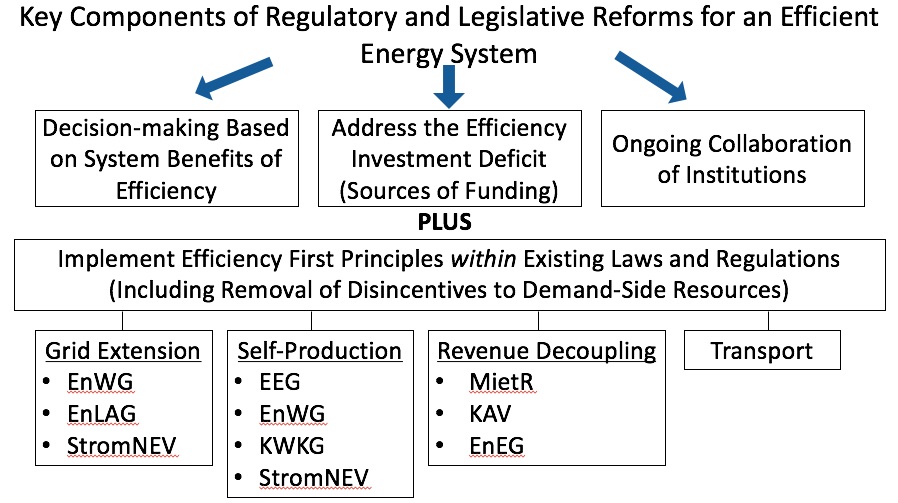Germany’s “Energiewende” (Energy Transition) represents a national commitment to meet aggressive economy-wide decarbonisation targets and to transform the German power sector from a reliance on nuclear and coal to renewable resources within the next four decades. Germany is unique in the European Union in arriving at a consensus among ruling and opposition parties for a full nuclear phase‑out by 2022.
Renewable resources currently comprise 30 percent of the German power mix, and the Energiewende targets for increasing that share are unprecedented—at least 50 percent by 2030, 60 percent by 2040, and 80 percent by 2050. In addition, the German government established aggressive targets for improved energy efficiency during this transition—a 25 percent reduction in total power consumption by 2050 (relative to 2008), even with the expectation that the heat and transport sectors will see a significant shift to electricity via heat pumps and electric vehicles.
With long-term targets in place, the current focus is how to accomplish these ambitious Energiewende objectives at reasonable costs to consumers and the economy as a whole. In particular, the government has acknowledged that “energy efficiency has not attracted as much investment as it financially deserves and requires in order to reach the efficiency targets.”
To this end, RAP’s work on Efficiency First: Unlocking the Promise of the Energy Union has included presentations and discussions with government officials and stakeholders in Germany to identify opportunities for successfully integrating Efficiency First principles into the Energiewende. For example, in summer 2015, European Climate Foundation, the Energy Efficiency Alliance, and other stakeholders began discussing the potential for a new energy efficiency law in Germany. They approached RAP to provide policy and technical advice on such an approach, drawing from international best practices. RAP’s Berlin office took the lessons learned globally from successful scale-ups of end-use efficiency and distilled them into a streamlined strategy for integrating Efficiency First into Germany’s legislative and regulatory framework. A summary of key components for this strategy is depicted as follows:

In Path to an Efficient Energy System in Germany (Wege zu einem effizienten Energiesystem in Deutschland), RAP created a companion to the visual framework depicted above to further explain how the lessons learned from international experience can be effectively applied in Germany. Drawing on experiences in California, New York, Vermont, the PJM power market in the U.S. Eastern Interconnection, and Great Britain, RAP recommends that Germany’s policymakers focus on:
- Quantifying the system benefits of efficiency for Germany’s Energiewende, and then fully integrating that analysis into an Efficiency First decision-making process;
- Removing the pervasive market barriers that inhibit private investment and tapping the full system benefits of efficiency by closing the efficiency investment deficit gap and creating a sufficient and sustainable source of public funding (not tied to annually appropriated budgets);
- Creating both the institutional capacity and a collaborative process among key institutions to lead an ongoing Efficiency First effort in Germany;
- Examining all existing laws or regulations to ensure that disincentives to demand-side resources are removed and positive incentives to Efficiency First decision-making are introduced;
Additional areas for consideration include:
- Decoupling of revenues from energy sales in existing concession fee laws;
- Developing rate/tariff designs that better align with Efficiency First objectives, or at least do not create disincentives that work at cross-purposes;
- Crafting rules to encourage end-use efficiency investments in buildings where rooftop PV installations are subsidised;
- Developing approaches to align incentives (e.g., authorised revenues) to Germany’s regulated grid operators with Efficiency First principles;
- Establishing grid investment criteria that explicitly consider demand-side options along with “steel in the ground” projects.
RAP presented these ideas to Germany’s Effizienzwende Association, Agora Energiewende, the Federal Ministry for Economic Affairs and Energy, and other key stakeholders and organisations (See Related Resources box). Within a relatively short period of time, RAP’s Efficiency First principles are gaining considerable traction. High-level ministry officials have publically emphasised that efficiency must now become the first priority of the Energiewende going forward, and the Ministry of Economy has announced plans to launch a strategy in 2016 to strengthen this narrative. RAP will continue to work closely with its partners, stakeholders, and government officials in Germany to develop concrete actions that support an effective Efficiency First strategy for the Energiewende.
